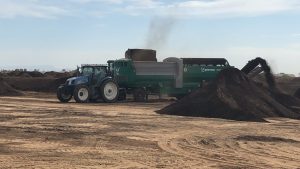By Heide Kennedy, Arizona Farm Bureau Communications Intern

On farm operations, composting becomes more and more valuable.
When you peel vegetables or cut up fruits, do you ever feel bad about all the peels and cuttings just going into the trash can? It can feel wasteful not to put them to another use. One way to keep your food scraps from ending up in the trash can is to compost them and use the compost for gardening!
Composting is the process where food scraps, leaves, and other organic materials decompose into the soil. The result is rich, nutrient-filled soil that helps plants to thrive. It is surprisingly simple to do and doesn’t require many supplies, as all you really do is create a pile and keep adding to it. Depending on the amount of space that you must dedicate to your compost, you can either just create a pile directly on the ground or use a bin to keep it more contained. Just make sure that wherever you put it has partial shade and plenty of drainage.
After you create your pile, all you must do to maintain it is to keep a balance of brown material such as leaves and twigs, and green materials such as fruit and veggie scraps. It’s also important to keep it moist and give it a stir regularly, about every 4-7 days!
Here are some ideas of good things to add to your compost:
- Fruit and veggies scraps
- Rotten fruits and veggies
- Paper products
- Eggshells
- Leaves and grass
- Tea bags and coffee grounds
When it comes to using your compost, you can sprinkle it over your plants, mix it into the soil, or use it in place of mulch! My mom loves to garden and is a big proponent of composting and using it for her plants. It’s a cool process to watch scraps be used to grow fresh, delicious produce!
The University of Arizona Extension program in all our Arizona counties offers Master Gardener courses that include composting practices. Additionally, composting resources can be found on its websites.
For more articles on gardening, reducing food waste, and produce, check out the Fill Your Plate blog!

